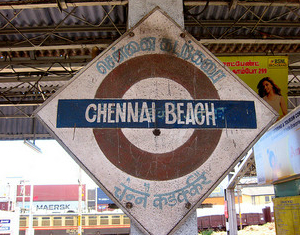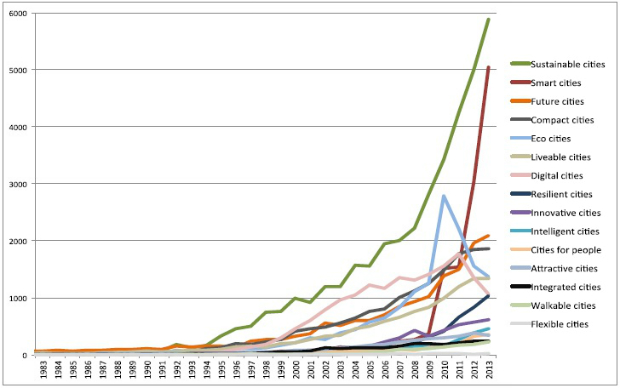Guest post by Caroline Twigg, Head of Partnerships at the Future Cities Catapult.

I recently lived in India, where English is widely spoken. English is my own mother tongue and, when discussing something with Indians, I often presumed that, just because ‘we both spoke English’, we would understand each other. For example, an Indian would say ‘stay’ where I’d say ‘live’, and I had many confusing conversations in hotels with the receptionist asking me where I was staying. It seemed to me totally obvious that I was staying at their hotel as I was trying to check in, but they were just asking for my home town!
Language can shape misunderstandings big and small. It can also put across subtle messages whether that was the intention or not. Several organisations have had to change their name as the messages become outdated or irrelevant. For example, until 1974 the Commonwealth Games was known as the British Empire and Commonwealth Games. In a recent article for the BBC, Kabir Chibber wrote that "start-ups are like newborns... the wrong name can scar for life". He wonders if Google would have been as successful if it had been called BackRub as originally intended.
So what’s this got to do with cities? We are at the point in time where ‘cities’ and their development is becoming a science and discipline. Companies with solutions are selling them through their ‘cities team', universities are setting up ‘urban laboratories’ to apply their varied research to an urban context, and analysts and think tanks are developing reports and insights into cities as a discrete area of study.
But it’s turning out to be a pretty complicated area to talk about.
The language of cities
In our recent report, What are Future Cities: Meanings, origins and uses, developed jointly with the Foresight Future of Cities project, we delve into the language being used around cities.
‘Smart cities’, which took over from ‘digital cities’ in about 2006, has connotations with data and control and technology often distant from citizens. ‘Eco-cities’ resonates well in Asia, but doesn’t tend to relate to existing places but only new purpose built cities. The US uses ‘intelligent cities’, but critics worry this is too top down and not human-centred enough, and prefer to talk about ‘intelligent citizens’. And ‘sustainable cities’, although the most used term when searching online, probably falls into the same bucket with ‘sustainable development’ – no-one is ever sure exactly what the user means when they say it. At the Future Cities Catapult we talk about ‘integrated city systems’, meaning the systems of energy, water, waste, human mobility and more working in tandem.

What is a 'future city'?
According to Kevin Johnson, the Mayor of Sacramento, we are entering the era of 'Cities 3.0'. 'Cities 1.0' were the first generation of metropolitan areas built around ports, rivers and transportation routes. The following generation, 'Cities 2.0', came during the industrial revolution and were based on ‘factories and big industry, smoke stacks and automobiles’. The modern day ‘Cities 3.0’ are cities of innovation, of entrepreneurship and of technology, ‘paperless, wireless and cashless’. As Kevin states, inhabitants of 3.0 cities have, "more cell phones than landlines, more tablets than desktops, more smart devices than toothbrushes."
‘Future cities’ means different things to different people, from post-apocalyptic dystopia to a zero carbon, flower filled utopia. It often conjures up pictures of flying vehicles and endless skyscrapers, or can be a very individual city tailored to the person imagining it.
To the Catapult it means several things:
- It is a collaborative place, where councils and city decision-makers work hand-in-hand with business, citizens and researchers, where neighbourhoods work together to care for public space, and were access to shared products and services like car pools or tool hire is enabled by technology.
- It is a connected place, where individuals understand how they are connected to their wider community, the systems that support their urban lives, and the other people and services they want to link to in their daily lives.
- It is a sustainable place, where inefficiencies and pollution are low if exist at all, and where citizens impacts on natural resources is minimised because cities are dense and resources shared and re-used.
- It is a citizen focussed place, where innovation happens to respond to citizen needs and city challenges, and where citizens feel ownership over decision-making, have the power and responsibility to co-create their own solutions to daily challenges, and manage budgets that affect their own neighbourhoods.
- It is a place that feels secure and equitable for citizens of all ages and walks of life.
- It is an innovative and thriving place – where new ideas find their own test beds, where failure is accepted and learnt from, where funding rewards sustainable and practical ideas, and where money is generated to fund new initiatives.
To some maybe this sounds utopian, but it’s my hoped-for future city.
As the report states, "one of the reasons for the complex and overlapping evolution in future cities language over time is that cities themselves are extremely varied." And as cities develop and new influences shape them, maybe new languages will come and go to describe the blossoming ‘science of cities’ we see around the world. Just as we are seeing a continual process of creation and redevelopment in cities themselves, we see adaptation and adoption of new languages about the cities.
One thing is clear to me: there will always be cities and there will always be a future, therefore 'future cities' is a strong contender for continued use!
Let us know your thoughts on the language of cities in the comments below.
Featured image by Flowizm on Flickr. Used under Creative Commons.
Sign up for email alerts from this blog, or follow us on Twitter.

2 comments
Comment by Oswald posted on
Gosh I never knew google was going to be called back rub. I think we all would still be using yahoo if that was the case. The concept of cities 3.0 is interesting. I wonder if there is a ideology of cities 4.0? I imagine this may well be when self driving cars are on the roads (a nod to the aforementioned Google ) this is expected as early as 2017 .There will also be considerations of population with Its ever increasing count. Would we become vastly over crowded similar to some major Asian cities? Interesting article
Comment by Isobel Cave posted on
Hi Oswald,
Thanks for your comment. You raise some interesting questions, which are just the kind of thing the project will be considering. If you're interested in population change, you might want to take a look at our blog post 'City populations: what can history tell us about the future?' which gives a flavour of the topic. Alternatively, you can read Professor Champion's paper in full here.
Isobel
Project Team,
Future of Cities